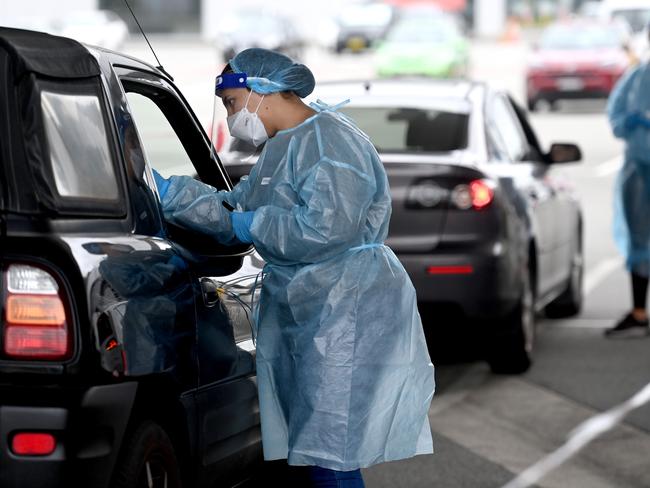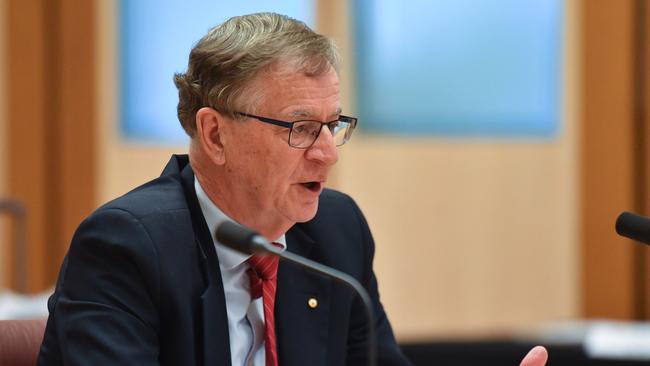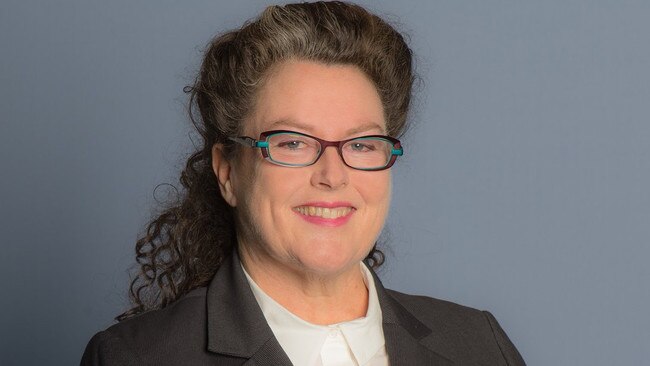Experts say Australians are ‘better off waiting’ for booster jab to protect against Omicron
Australians living in fear of a new Covid variant could disrupt their Christmas are being urged not to fast-track booster jabs.
Coronavirus
Don't miss out on the headlines from Coronavirus. Followed categories will be added to My News.
Australians are being urged to hold their nerve and not race to get early booster jabs to protect themselves against the new Omicron Covid variant.
It comes as scientists at the Kirby Institute are preparing to rapidly grow samples of the Omicron variant in the next few days to test whether it is more resistant to existing vaccines.

And experts have revealed new versions of Covid vaccines could be ready for production within six to eight weeks if research shows the new variant is more deadly and that existing vaccines do not work to control it.
Australian National University infectious diseases expert Professor Peter Collignon is urging Australians not to panic and try to get an early booster vaccine before Christmas.

“We’ve got no evidence that Omicron is not covered by the current vaccines,” Prof Collignon, an infectious disease expert with the Australian National University, said.
And there was evidence from other vaccines like hepatitis B that you got longer lasting immunity, if you extended the gap between vaccine doses out further, he said.
“In England, where they spaced the first and second dose (of Covid vaccines) three months apart instead of a month apart you got better protection as well,” he said.
Most Australians have only just received their second shot of vaccine and their immunity against Covid is currently at its peak, he said.
The warmer spring and summer weather also meant any new variant would have a tougher time spreading here as people were more likely to get together outdoors.
“The fear at the moment is out of proportion to the data,” Prof Collignon said.
“I would think that it is unless we’ve got uncontrolled spread of the virus, that you’re better off waiting till six months for your booster.”
Deakin University epidemiologist Professor Catherine Bennett agrees.

“We need to first understand how the current vaccines cover this new variant, and what threat it poses,” Prod Bennett said.
“If it is more infectious, and vaccines cover it we might want to bring forward the booster, especially for those who are more vulnerable to serious disease. If it turns out to not be more infectious than Delta, and illness profile is same or more mild, then we probably just proceed as normal with boosters.”
Meanwhile scientists at The Kirby Institute at the University of NSW are preparing to grow the Omicron virus cells from the infected South African travellers to test them against vaccines and treatments.
Associate Professor Stuart Turville said his team at the institute had developed a platform that could take small samples of the virus and grow it rapidly overnight.
Once he has enough virus he will take various antibody samples from the blood of people given different Covid vaccines and test them in dishes in his lab to see if they work against the new variant.
Within a week these tests will show whether one vaccine shot or two is needed to protect against the variant.
He can also test new antibody based treatments for Covid on the new variant to see if they work against it.
“We built essentially a very fast high content kind of platform based on cells we engineered in which the virus loves to grow in so they’re like putting gasoline on a fire for want of a better description that they just love to pick up the virus and grow,” Assoc Prof Turville said.
“A process that used to take a month now takes a week.”
Associate Professor Nathan Bartlett – who has worked on nasal sprays to beat Covid – said experts were worried about Omicron “because of the sheer number of new mutations” to the virus.
All up there were 30 mutations in the Omicron variant.
The most worrying mutations are in the receptor binding domain of the spike protein the virus uses to attach to our body.
In the Delta variant there were two mutations to this spike protein, in Beta (also from South Africa) there were 3 mutations to this spike protein and it was more resistant to vaccine protection.
Omicron has 10 mutations in this crucial spike protein.
“It’s thought this could increase its ability to bind to your cells and make it more efficient at infecting you,” Assoc Prof Barlett said.
Griffith University’s Associate Professor Paul Griffin said if tests in the next few weeks show the new variant is more deadly and that existing vaccine do not provide enough protection it won’t take long to make a new version of mRNA vaccines to protect against it.

“The really good news is it’s probably only going to be six or eight weeks because those platforms are so well trialled now and we understand the safety of them so well, we don’t need to replicate all the clinical trials,” Assoc Prof Griffin said.
Professor Collignon said authorities need to wait until we get more data on the new variant before making sweeping changes to policies.
“If there were a lot of vaccinated fully vaccinated people in South Africa, in hospitals with this strain disproportionate to their percentage of the population and then I would be concerned,” he said.
“But nobody’s presented that data. In fact, what I’ve seen from South Africa is the opposite is still mainly unvaccinated people that are in hospital.”
ANU’s Professor Peter Collignon and Deakin University’s Professor Catherine Bennett said we should wait for the evidence on whether existing vaccines work against the variant before making a decision on speeding up access to third doses.
However, University of NSW epidemiologist Professor Raina MacIntyre and Kirby Institute’s Dr Deborah Cromer and the OzSage group of experts are urging booster doses to be brought forward from six to two months after the second dose.
“Waning immunity after dose two starts two to three months after the second dose – the booster can be given any time from 2-6 months after the second dose, and we should be encouraging rapid, high third dose uptake,” Professor MacIntytre said.
Dr Cromer said “Booster shots increase immunity against the virus”.
“What we have seen is that higher levels of immunity are required to combat new variants (both to protect against any infection and severe disease). Therefore, boosting immunity overall will help in combating disease from emerging variants,” she said.
More Coverage
Originally published as Experts say Australians are ‘better off waiting’ for booster jab to protect against Omicron





